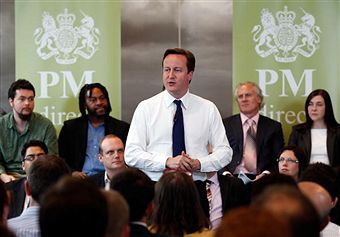 You can often achieve a lot more by doing things a bit at a time rather than attempting
one bold and sweeping reform.
You can often achieve a lot more by doing things a bit at a time rather than attempting
one bold and sweeping reform.
In the 1970s, for example, the trade unions had extraordinary legal privileges; strike votes were done on a show of hands at works meetings (usually late at night when everyone except the Trotskyists had gone to bed); there weren’t even secret ballots for union elections.
Edward Heath took the unions head on with his all-embracing Industrial Relations Act. It was a disaster: there were widespread demonstrations and strikes, and one of these confrontations forced him from office. Margaret Thatcher learnt from this and took things much more slowly. First, the government offered to pay for unions to hold postal strike ballots (which the ordinary, non-Trotskyite members rather liked). Then the same for union elections. Then secret ballots became compulsory. And so it went on, the unions’ special privileges gradually being eroded, but in steps too small to bring everyone out on the barricades.
My colleague Dr Madsen Pirie even coined a name for this approach: micropolitics. And using it, we went on to privatize countless industries, and to reform health, council housing and (partly) schools. So it’s a big turn-around for me when I say that today, our situation is entirely different. Government has become so big and bloated that we need to re-shape the whole thing.
This is not something that you can fix a bit at a time, especially when government spending accounts for more than half of the country’s spending. We all know that government as a whole needs to be pruned back, but equally, we all enjoy at least some of the goodies that it hands out, and we don’t want our particular goodies to be pruned.
Just suggest to the well-off middle classes that they should lose their tax credits. Or give up their children’s free milk. Not only do you face the howls of indignation from the people who actually enjoy these benefits. Everyone else joins in the howling too, because they fear that their own special freebie could be next on your hit list.
So the only way to make real changes is with a comprehensive package of reforms. As former finance minister Jens Henriksson says of his own experience in bringing Sweden’s budget under control, you need to show that you are not partisan or singling out particular losers. A vocal interest group can derail even the smallest programme cut, he says; but you are much more likely to succeed with a comprehensive package of reform that gets everyone complaining. People are more likely to give up their special privileges if they think that everyone else is sharing the pain as well.
Canada too turned round a massive budget deficit by packaging its reforms. Nothing was ring-fenced, so everyone knew that the pain would be spread. That made possible a major rationalization of government. The lessons for the UK’s Comprehensive Spending Review in October are pretty obvious. Try to avoid contention by limiting your reforms, and you will fail. Court contention with a major restructuring plan and you have a good chance of achieving something really important.
Eamonn Butler is Director of the Adam Smith Institute






Comments